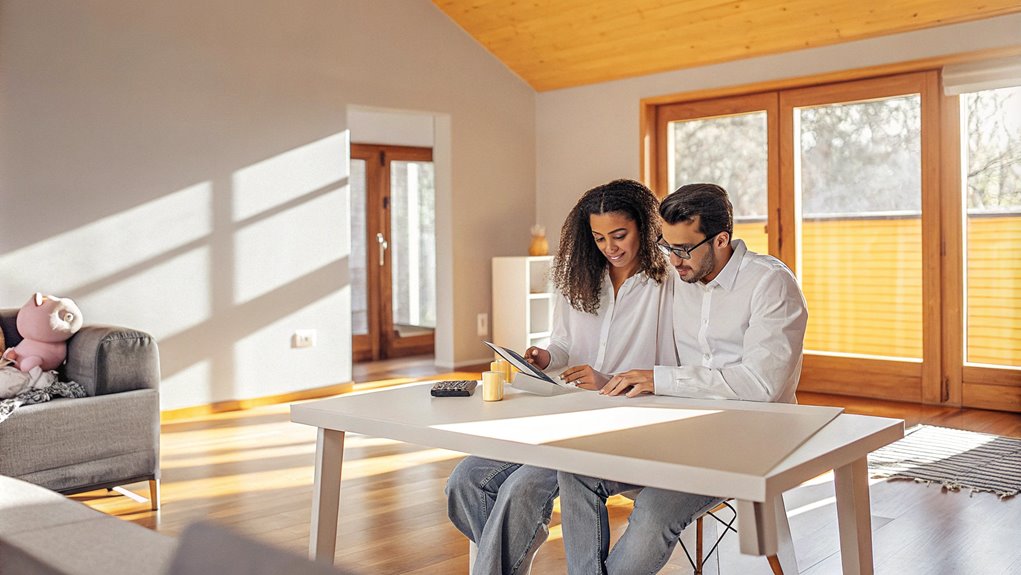Buying your dream home doesn't have to break the bank. First, look at what other homes cost in your area. Check houses that sold in the past six months near the one you like. Ask more than one expert to tell you what the home is worth. Know how much you can spend based on what you earn and need to pay for each month. Try to buy in winter when prices are often lower. Don't let your heart make you spend too much money. Find good people to help you, like a home expert who can spot problems. When you use these tips, you can find the perfect home without paying too much.
Ready to start building equity in your own Michigan home? Get your personalized home loan quote today.
Research Local Market Prices

Looking at home prices in your area helps you get a good deal. First, look at what nearby homes sold for in the last few months. Find homes that match what you want – like the same size and number of rooms.
Go online to see how much people ask for homes and what they end up selling for. See how long homes sit for sale. Watch how prices change with the seasons. Talk to real estate agents in your area – they know a lot about homes for sale.
When you know what homes should cost, you can spot the ones that cost too much. This helps you get a better price when you buy.
Michigan residents, unlock the door to your new home. Request your home loan quote from Treeside Financial today.
Get Multiple Property Appraisals
Ask a few experts to tell you what they think your home is worth.
Get them to look at it in different ways – like checking what other homes nearby sold for and how much it would cost to build your home today.
Look at what similar homes in your area are selling for. You can also use websites that tell you home values.
Get one expert to look at your home when you start looking to buy. Then get another expert near the end.
This helps you know if prices have changed and helps you make a better deal.
Compare Different Appraisal Methods
Getting a fair price for a home means looking at its value in different ways. Think of it like checking a car from all sides before buying it.
Let's look at four simple ways to find out what a home is worth:
- Look at nearby homes: Find out what other homes like yours sold for. If they've more or less stuff than your home, adjust the price up or down.
- Building costs: Find out how much it would cost to build the same home today. Take away some money for how old the home is.
- Rental check: See how much money the home could make if you rent it out. This helps if you want to be a landlord.
- Computer guess: Some websites can tell you what they think a home is worth right away. But don't trust just these numbers alone.
Using all these ways together helps you know what price makes sense. This makes it easier to talk about money with the seller.
Research Local Property Values
Looking at house prices is like putting together a puzzle. You need lots of pieces to see the whole picture.
Start by looking at what houses near you sold for. Check what houses cost if they're the same size as the one you want. Look at prices from the last few years too.
You can find house prices at your local tax office. Many websites also show house sales. Look at houses that are like the one you want. Make sure they've the same number of rooms and space.
Think about what makes a house worth more or less. Good schools nearby help. Safe streets matter too. Stores and parks close by can make a house cost more.
Talk to people who sell houses in your area. They know a lot about which streets are best and what houses are worth.
Time Multiple Appraisals Strategically
Getting more than one home value check at different times helps you learn how prices change.
By planning when you get these checks, you can make a better offer on a home.
Here's when to get your home checks:
- Get one in spring or summer when home prices are high
- Get one in fall or winter when home prices are lower
- Get one when you hear news about new things being built near the home
- Get one right before you want to buy the home
This helps you know what a fair price is and when to buy.
You won't pay too much if you know how the price has moved up and down.
Calculate Your Maximum Budget

Figuring out how much house you can buy is like planning for a big purchase.
First, look at how much money you bring home each month. Then, add up what you spend on things like power bills, car costs, and other bills you must pay.
Think about how much cash you can put down now – a bigger down payment means smaller monthly house payments.
Once you do the math, you'll know the most you can spend on a house while still having enough money for your other needs.
Monthly Income Vs Expenses
Money In and Money Out: A Simple Guide
Looking at your money helps you know how much house you can buy. Start by counting what comes in and what goes out each month.
First, add up all your money:
- Your job pay
- Money from things you own
- Extra work you do
Then, list what you pay for:
- Car bills
- House stuff like power and water
- Food costs
- Things you buy each month
Don't forget about fun stuff:
- Going out to eat
- Movies and games
- Shopping trips
To stay safe with money:
- Keep some extra cash for when things break
- Don't spend more than a quarter of your pay on house bills
- Save some money for surprise costs
This way, you can buy a house and still have money for other things you need.
Down Payment Planning
Let's talk about saving money for your new home!
First, look at what you have saved up right now. Count your savings and any money you can get from selling things. Keep some money aside for when you need it – enough to pay your bills for 3-6 months.
Most home loans want you to pay 20% of the home price up front. This means if you save $50,000, you can buy a $250,000 home.
But if you don't have that much, don't worry! Some loans let you pay as little as 3.5% up front. With that same $50,000, you could buy a much bigger home worth $1,425,000.
But remember – when you pay less up front, you'll have to pay more each month later.
Inspect Beyond Surface Appeal
When you're buying a home, don't let pretty rooms and new paint fool you. You need to look deeper to make sure the house is worth your money.
Think of a house like a body. It needs a strong backbone and healthy parts to work well.
Check these things:
- Look at the base of the house for cracks
- Walk on floors to see if they're flat
- Check walls and floors for water spots
Look at the parts that keep the house running:
- The heating and cooling system
- The power box
- The pipes that carry water
Look up at the roof:
- Are any parts broken?
- Does rain flow away from the house?
- Do you see patches from old fixes?
Feel the windows:
- Does cold air leak in?
- Do they get wet inside?
- Can you open and close them well?
Nice-looking updates can hide big problems. Find them before you buy, or you might spend lots of money later to fix them.
Time Your Purchase Strategically

Winter is a great time to buy a house. Not many people shop for homes when it's cold. This means sellers want to make a deal with you. They may take less money for their house.
Look at house prices in the areas you like. Check real estate websites to see what homes cost.
Watch how prices go up and down during the year. When prices drop, that's your time to make an offer. You can save money by picking the right time to buy.
Shop During Winter Months
Winter is a great time to buy a home. Not many people look for homes when it's cold. This means you can get better deals.
In winter, home sellers want to sell fast. You can:
- Get a home for less money
- Find out if the house stays warm
- Get more help from your agent
- See if the house has problems with ice or cold air
You can spot things like drafty windows and poor heating. Your agent will have more time to help you find the right home. Plus, sellers often want to finish the sale before the new year.
Looking at homes in winter lets you see how well they work in the cold. You can check if snow makes problems on the roof. You can feel if rooms are too cold. These are things you can't test in warm months.
Track Market Price Trends
Watch home prices like a hawk
Homes go up and down in price, just like your favorite toys at the store. Look at how much houses cost now and what they cost last year. Pick the streets where you want to live and learn their prices.
Keep an eye on bank rates and jobs in your town. When more houses get built, it can mean prices will change. You can find this info on home search apps and your local news.
Make a list of homes you like and watch their prices each week. When homes take a long time to sell, or prices stop going up, it's time to buy.
Buy when other people aren't buying – you'll save money this way.
Master the Art of Negotiation
Buying a home can make anyone feel nervous and excited. You need to be smart when talking about price with the seller. Think of it like making a deal with a friend – you both want to feel good about it.
Know what homes cost in the area. Write down what you want to pay and why. This helps show the seller you did your homework.
Look at the house closely. If you find things that need to be fixed, ask the seller to:
- Fix the problems
- Lower the price
Be open about when you can move in. This can help you get a better deal.
Stay calm, even when things get hard. Know the most you can spend. If the price is too high, it's OK to look for another house.
Remember: There are lots of great homes out there. The right one will come along at the right price.
Consider Future Resale Value

When you buy a home, think about selling it later. Even if you want to live there a long time, you want your home to be worth more money when you sell it.
What makes a home worth more:
- Good schools and safe streets nearby
- Easy to shop, eat, and have fun close by
- Clean, fresh-looking rooms inside
- Close to buses and trains
- Growing number of people moving to the area
Look at how home prices in the area have gone up or down. Pick a home that most people would like – not one that looks too weird or different. Find homes near good jobs and schools, as these bring in lots of buyers. What looks cool today might need fixing tomorrow when you want to sell.
| Things to Check | Why They Matter |
|---|---|
| Good Location | Schools, safety, stores |
| Home Style | Simple design, fresh look |
| Area Growth | New buildings, more people |
| Getting Around | Buses, trains, roads |
| Local People | More families, good jobs |
Compare Similar Recent Sales
Looking at what other homes sold for helps you get a good deal. You need to look at homes like yours that sold in the past few months. These are called "comps." Look at homes that are the same size and have the same number of rooms.
To find the right price:
- Look at homes that sold near you – no more than half a mile away
- Only look at homes that sold in the last six months
- Think about what makes each home different
- Find out how much people paid for each square foot
This will help you know if the price is fair. It's like comparing prices at a store to make sure you don't pay too much.
Work With Experienced Professionals

You need good people to help you buy a home. Find a real estate agent who knows your area well. Pick a loan expert who can get you good rates.
Get a home inspector to look at the house before you buy it. They can spot problems you might miss. You also need a lawyer to check all the papers and help you get a fair deal.
Make sure these helpers are good at their jobs. Look up what other people say about them. Ask them about homes they helped with before.
When you can, pick people who've worked as a team. This makes things run better for you.
Avoid Emotional Decision Making
Buying a home stirs up lots of feelings. These feelings can make it hard to make smart choices. You want to keep a clear head when you look at homes.
Here's what you can do to stay focused:
Know your money limit first. Don't look at homes that cost more than you can spend.
Make a list of what you need in your home. Check each home against this list.
Look at a home twice. Go at different times to see what it's really like.
Take lots of pictures. Write down what you see. This helps you think about homes in a fair way.
When you think with your head and not your heart, you make better choices about buying a home.







